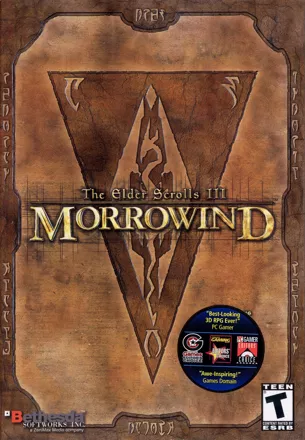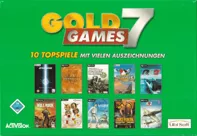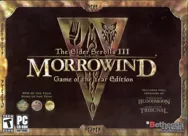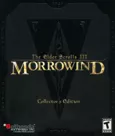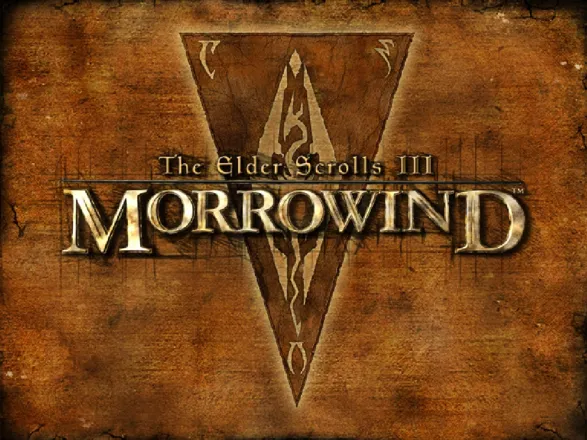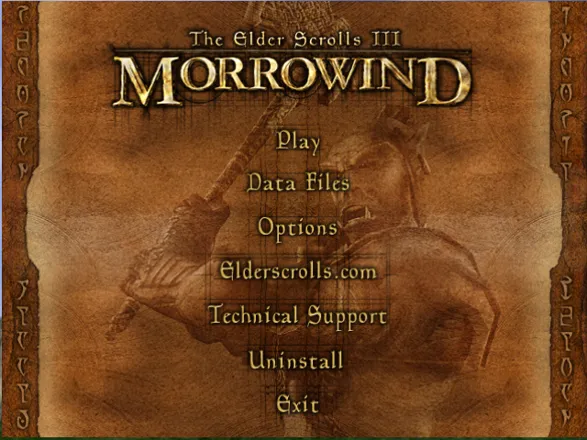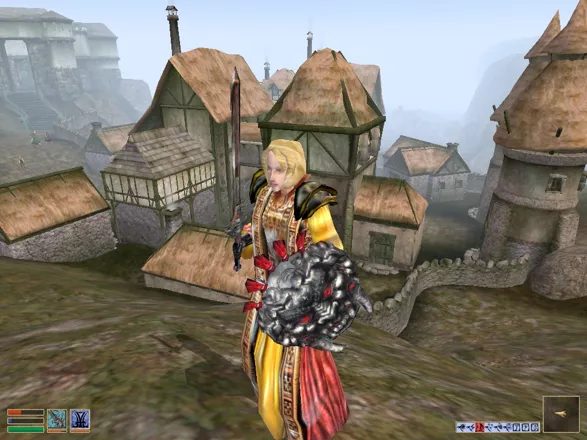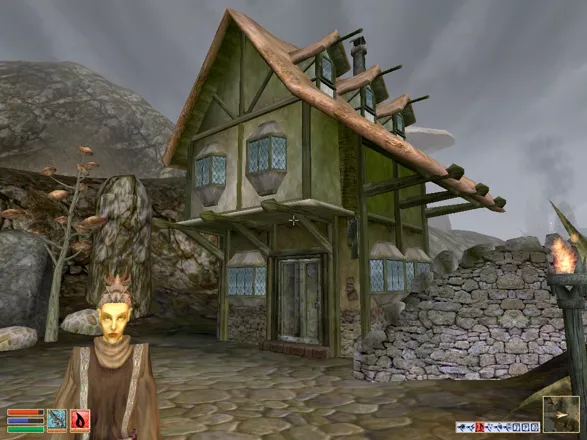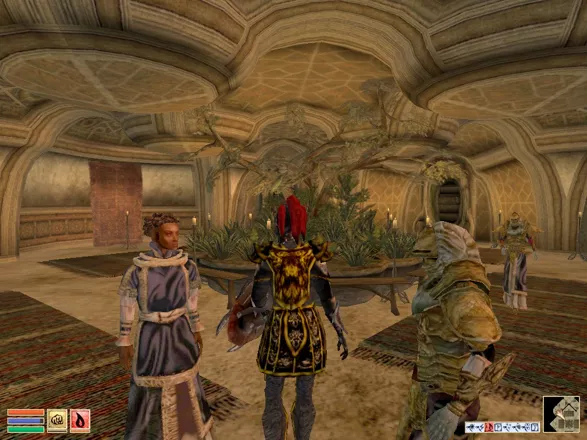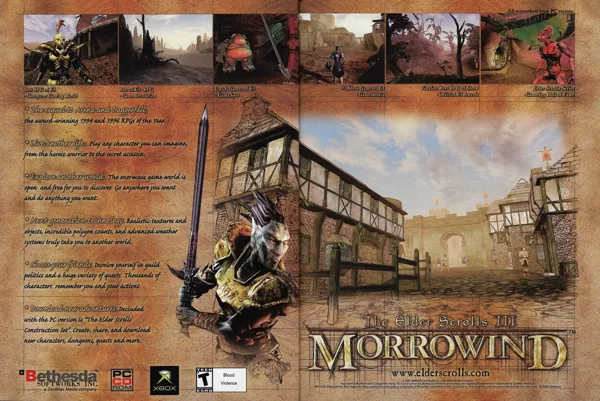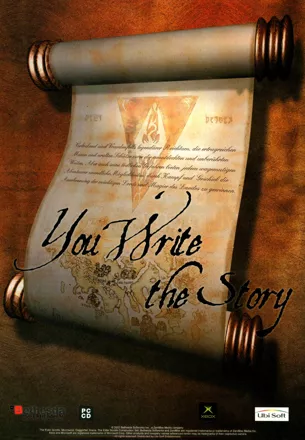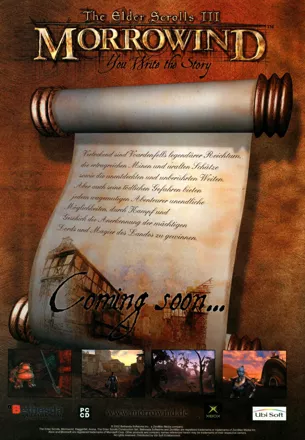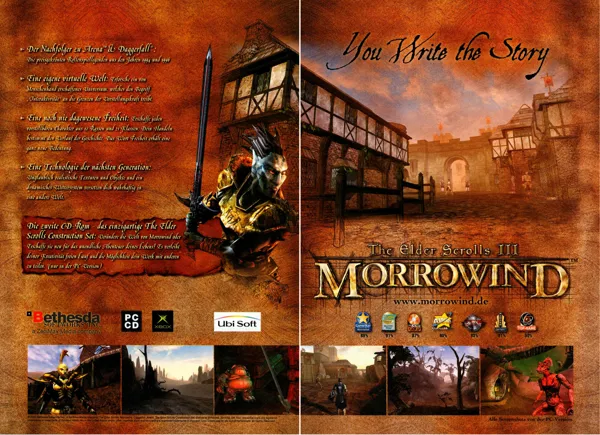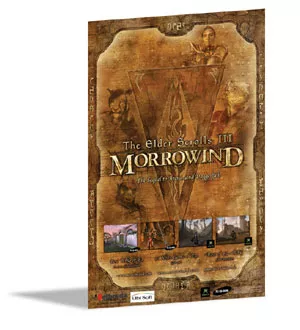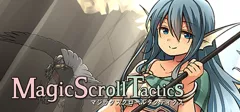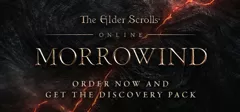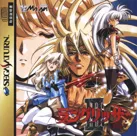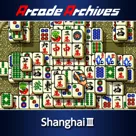The Elder Scrolls III: Morrowind
Description official descriptions
Freed by the decree of Uriel Septim VII, the Emperor of Tamriel, a lone prisoner is transported to the province of Morrowind. It seems that the strange dreams this prisoner has been having lately may have a connection to equally strange events occurring there. The protagonist is given a simple assignment: join the Blades, a secret organization whose goal is to protect the safety of the Emperor. This leads to a discovery of an ancient prophecy and an evil scheme concocted by a powerful deity whom the protagonist alone is able to stop.
Conceived in the tradition of the Elder Scrolls series, Morrowind is a fantasy role-playing game with a vast world open for exploration. After being released from a prison ship at the shores of the island Vvardenfell, the protagonist may do more or less what he or she wants: follow the main quest and solve the mystery of an ancient prophecy, join any of roughly a dozen guilds and rise in their hierarchy by performing duties, or simply explore the gigantic island with its stylistically diverse cities, hundreds of dungeons and tombs, ancient ruins and mighty fortresses.
Morrowind uses a two-stage skill system. The hero’s primary stats (strength etc.) increase with each level gained, while secondary abilities improve by use – for example, the more often the character jumps, the more proficient he or she becomes in the Acrobatics skill, etc. The action-oriented fights are simple exchanges of strikes or spells, until one combatant dies. The enemy's hit points and condition were not originally shown; however, at the request of customers a health bar was added for enemies as part of the first upgrade patch.
The protagonist's race and gender, but also his or her reputation influence the reactions of NPCs. If a character’s sympathy for the hero is low (rated on a scale from 1 to 100), he might refuse to answer questions; if it is high, the player will get more detailed information and better bargains in shops. Most quests involving other persons can be solved by persuasion, pick-pocketing, or simply by force.
The game's NDL 3D game engine is powerful in drawing wide, detailed outdoor landscapes as well as complex indoor environments. Transitions are not fluent; houses and dungeons must be loaded upon entering.
Spellings
- 上古卷轴III:晨风 - Simplified Chinese spelling
- 上古捲軸 III:魔捲晨風 - Traditional Chinese spelling
Groups +
- Animals: Cats
- Console Generation Exclusives: Xbox
- Covermount: Fullgames
- Elder Scrolls series
- Fantasy creatures: Dwarves
- Fantasy creatures: Elves
- Fantasy creatures: Orcs
- Gameplay feature: Alchemy
- Gameplay feature: Burden / Encumbrance
- Gameplay feature: Character development - Repetition
- Gameplay feature: Drowning
- Gameplay feature: Equipment quick slots
- Gameplay feature: Hunting
- Gameplay feature: Journal
- Gameplay feature: Paper doll inventory
- Middleware: Bink Video
- Middleware: Gamebryo / Lightspeed / NetImmerse
- PC Gamer Presents games
- Physical Bonus Content: World Map
- Protagonist: Female (option)
- Software Pyramide releases
- Technology: amBX
- Ubisoft eXclusive releases
- Xbox Classics releases
- Xbox Platinum Hits releases
Screenshots
Promos
Videos
Add Trailer or Gameplay Video +1 point
See any errors or missing info for this game?
You can submit a correction, contribute trivia, add to a game group, add a related site or alternate title.
Credits (Windows version)
118 People (80 developers, 38 thanks) · View all
| Project Leader | |
| Lead Designer | |
| Lead Programmer | |
| Lead XBox Programmer | |
| Lead Artist | |
| Lead Character Artist | |
| Programming | |
| Additional Programming | |
| World Art & Building | |
| [ full credits ] | |
Reviews
Critics
Average score: 89% (based on 83 ratings)
Players
Average score: 4.0 out of 5 (based on 284 ratings with 23 reviews)
The Good
I have to admit I'm only barely acquainted with the previous Elder Scrolls titles, having played Arena ages ago and skimmed past Daggerfall but pretty much missing out on it when it got released. Still I knew enough of what was in store for me when I installed Morrowind, and in some aspects I am happy to say I got what I wanted.
For starters Morrowind delivers on what it was it's most hyped feature: the sheer size, detail and freedom of it's game world. So far this is THE game as far as expansive "sand box simulators" go. Ultima Ascension, Baldur's Gate 2, GTA, etc. etc. Nothing comes close to the sheer size of Morrowinds gameworld. And the amount of npcs populating it, quests to do, dungeons, items and assorted stuff is second to none. I played the game for months as far as I can recall and while I didn't log any "official" gaming hours I must have played three times the lenght of Baldur's Gate 2, and a quick look at my world map by the endgame only showed about 75% of it as explored...
For as extensive as it is, Morrowind's gameworld is also very detailed, with five distinct architectural styles (the classic "ye olde medieval" castles and keeps, the bizarre, organic dwellings of the elf mages, the indigenous villages of the local dark elves, the stylized settlements of the deserts, and the gargantuan leftovers of a long-forgotten civilization). These styles are applied to lots of cities and locations, some small enough to explore in 10 minutes or so, and some others sprawling over 5 loading zones and needing a transportation system of it's own like Vivec. Thriving in these locations are dozens of underground societies, guilds and mob families, each having their collection of quests, sideplots and characters for you to explore with total freedom of action (Want to become a slaver and aid hunting raids? Want to oppose slaving and go across the land aiding a Greenpeace-like society that liberates slaves? No problem either way).
Of course, handling such a gameworld would be a nightmare through the classic sprite 2.5D engine of the previous games, so for the first time the Elder Scrolls goes 3D, and the results are nothing short of amazing. The graphics engine manages to render the entire gameworld with smooth, detailed textures and models, as well as special effects that help create incredible foggy swamps, blinding sand storms, stormy weather, cool magic effects and one of the most amazing water effects conceived to it's date. Make no mistake, you do need one badass machine to run this one, specially since you are going to want to crank up the resolution to take in all the detail in the game, which includes unique models for each item and armor piece as well as for those tiny forks, plates, and decorations that fill each house.... amazing doesn't even begin to describe it. And then there's the complementing music and effects, which fits the game perfectly thanks to some stellar orchestrations and moody tunes.
As for the story, the game falls for the typical "legendary prophecy" stuff, but manages to inject some interesting twists on it by including government conspiracies, and generally playing around with the "requirements" you need to meet to fulfill said prophecy. Basically there's this ancient evil god sealed behind a magic wall at the center of the isle of Morrowind, the ancient god is awakening and threatens the known world and whatever, with only the help of another reincarnated god as the last hope.... at least that's what the natives of Morrowind believe, and knowing this, the government across the sea sends you, a former prisoner, as the reincarnated deity, tasking you with fulfilling this "prophecy", and aiding you along the way, but with their objective being getting a key person inside the reclusive Morrowind society and messing around with the local government. As expected both plotline share their place in the spotlight and intersect many times, generally making for a pleasant, if not extremely original, storyline.
All that plus diseases, the ability to become a vampire (and boy does that open up a whole new set of rules), fly around, make your own spells, potions and enchanted items, and fool around with an editor!
The Bad
Unfortunately this extremely ambitious title reached it's goal but disregarded some elements that can only be described as really hardcore design flaws, poor balancing and lame gameplay.
The design of the game was to make a massive, all-encompassing rpg, so it's a priority to have functional elements to help you keep track of what you are doing and what's going on around you. As in every other rpg out there this translates into a journal, however rarely has an rpg had such a poor excuse for a journal as this. Suffice to say that only the useless journal in Ultima Ascension is worse than this piece of crap. Well, actually they are pretty much the same! They both just write down whatever happens cronologically. Yes, Morrowind adds an hypertext linking system for easier navigation, and separates completed quests from the rest... but that's it! I can't even begin to recount the amount of quests I lost because I forgot about them and/or couldn't find their information in this godawful excuse for a journal.
Other holes in the design come in the form of zero damage feedback for combat, do you want to know how hard you are hitting your enemy? Or if this weapon is really better than that other one against that type of baddie? Well wait and see how long it takes for it to drop down, as there's no other way of telling... And I just loooooove the psychic police forces of Morrowind. Picture this situation: you (a thief) pull out a major heist in a mansion and leave town with dozens of unique and valuable items, right? Now in a city that's in the other side of the island you get caught pick-pocketing. And guess what? After paying the customary fine the cop takes what you stole that time, the loot you got from that amazing heist and every item you ever acquired by thievery, no matter if you have been using it from the beginning of the game! That is a real encouragement for thief characters, isn't it? And every time you run into the law it's the same... lovely. Thankfully if you dump everything you have on the floor right next to you the cops do nothing and leave, but it's still pathetic. Maybe even more so.
Moving on, the rpg mechanics are handled by a sturdy skill system similar to the previous Elder Scrolls games which improves not by the acquisition of generic experience points, but thanks to it's actual use and/or paid training. In other words: jump around a lot and your athletics skill increases, sneak around successfully and so does your sneak skill, bash lots of heads and you get better at handling that particular weapon, etc. I've always liked this type of systems, but whenever done correctly they would become extremely challenging and slow paced... fortunately that's not the case here, as the poor balance means you can max out most skills in no time and the "no classes" approach to gaming means even a thief can be a mage-slaying powerhouse and a giant barbarian can sneak around and steal like a pro thief... so much for specializing.
As for the gameplay and the many quests that populate Morrowind, they are completely filler material, with really uninspired quests that call for you to get this or that item and deliver it to X character and on and on and on. To be fair most of the main plot quests are cool and there are many sideplots worth exploring, but they are lost in a sea of mundane and stupid quests. Quest which would still be worth doing if at least you met interesting characters to interact with. However save for a couple of key characters in the game the rest are soulless drones. It really puzzles me the way Bethesda handled npc interaction... talking to a character opens up a dialogue window from which you pick up the desired topics of conversation as hypertext links... (Hi! I would like to ask you about....monsters,you,this city, etc...) The resulting conversations unfortunately are all generic lines blurted out on and on and on in the same way all over the island. Should you ask a key warrior character why is he a fighter he would suddenly abandon whatever demeanor he had previously and blurt out the same generic, resume-like explanation of what a fighter is and does as every other character in the rest of the island and the same with everything else (but those class descriptions really are the pits, really, whoever wrote that deserves to be shot on sight). It really is mind-boggling how could Bethesda waste so much time populating this gigantic gameworld with drones and think they had done a good job... Congratulations Bethesda: you officially have the game with the worst case ever of "signposts npcs", not even japanese rpgs match up to your title! And you know what? This takes it's toll on the game's freedom of action. After all, what's the point of straddling morally bleak lines if you get the same reaction from everyone either way?
Aside from that there are lackluster character animations (everyone moves as if they had the proverbial stick up their asses), so little monster variations that you'll think you are in a pterodactyl-only sequel of Carnivores and assorted problems with game balance and combat that make it significantly less of what it could have been (just whack away!!).
Also the ending SUCKS ASS. After the countless hours I spent in the game I get a half a second cutscene and that's it??? Damn you Bethesda!!
And where the hell are the horses? One of the coolest things in Daggerfall was having one and casting a levitation spell!! Ride of the Valkyries baby!!
The Bottom Line
An extremely ambitious title that achieved it's giant scope at the expense of some critical design elements that kills it in the minds of many gamers, or just make it less than perfect to others. I think I fall somewhere in the middle, as I think the game is horribly flawed, but also has a lot going for it and it's achievements deserve recognition.
Make your own mind about it, two things are sure about it: It's the biggest most gigantic crpg experience ever (and that's without taking into account the expansions) and it's almost equally annoying in it's problems.
Windows · by Zovni (10504) · 2004
Although flawed, still one of the best console RPGs to date.
The Good
The first thing that strikes you about Morrowind after a few hours of play is the sheer enormity of the game world. There is a LOT to do, but the game starts you off with very little clue about what to do. For some gamers (like myself) this may be a dream come true in gaming: a huge world to explore and complete freedom to do as you please. For other gamers (like a few friends of mine), this is a complete gaming nightmare. "You mean I have to wander around for hours and explore and talk to people just to figure out what the point of the game is?!?!?" Yes, you do, but if you can appreciate that sort of depth in an RPG, it is truly a wonderous thing to behold.
Let us talk about the degree of that depth for a moment. When I say you can do as you please, you really can. Feel an item at a shop is too expensive? Steal it (if you can get away with it). Don't want to help the arrogant noble woman find her way across the mountians? Don't bother. In fact, you can just kill her and steal her clothes if it strikes your fancy. Don't feel like coughing up a handfull of gold every time you want to stay at your favorite inn? Murder the innkeeper and his guard, and stay there free of charge as often as you please. All these actions, of course, have consequences. You have a reputation rating, based upon your actions, and that rating affects how NPCs in the game will react to you. Most people won't want to talk to 'Entorphane the notorious outlaw', but will be much friendlier to you if you don't make a habit of running around killing people and generally wreaking havoc.
So what is the point of this game, you ask? Well, you are a stranger in a strange land; a prisoner granted an unexplained and unexpected pardon from the Emperor himself. Soon you find yourself working for the Blades, the Imperial spy network, and the story unfolds from there. In addition to the Blades (the so-called 'Main Quest') there are a large number of other factions, guilds, and mafia-style family houses you can join the ranks of. All of these other factions have a fairly large number of missions to perform, given to you by various faction leaders scattered all around the map. You can do them or not, the choice is up to you, but as you complete missions for the various factions, your rank in those factions rises, eventually allowing you to vie for their leadership. By the end of my game I was the head of the Mages and Fighters guild, and ranked very high in a family house and several other groups.
A wonderful and somewhat unique feature of 'Morrowind' is the ability to create custom magic spells and magic items. You can enchant almost any item you find with any spell you know (if you have a high enough enchatment skill), allowing for the creation of just about any custom magic item you feel you may need. The process is somewhat confusing at first (thanks to the somewhat lacking manual), but once you figure out what is going on, it's awesome. Want a ring that allows you to breathe and see clearly underwater while you are wearing it? That's cool, just make one, or go to an enchanter and pay (a LOT) to have one made. It's a marvelous feature, that later in the game especially, allows you to create a wealth of magic armor, weapons, and so forth, all with precisely the effects you wish them to have.
The skills system in this game is great as well. It's very simple, and very effective. You have a skill list and all characters have the same skills. The difference lies in what you choose for your primary and secondary skills (which level up faster) and your tertiary skills. Every time you use a given skill (hit an enemy with a sword, cast a spell, pick a lock, etc.) your skill goes up a bit, eventually rising to it's next level. When you raise 10 primary or secondary skills by one level, your character's overall level increases, bringing along with it the usual upgrade in hit points, magic points, and so forth. It's a very well thought out system, that ends up allowing you a tremendous amount of freedom to mold your character into precisely what you want him or her to be.
It must be said also that graphically this game is most impressive. Look at the water. It looks freakin' real, I tell ya! The sheer amount of detail in the game is amazing. Everywhere there are plants and fungi you can gather (for alchemical purposes, if you want to make potions). There are dozens of caves, tombs, and ruins scattered all over the map to explore and loot for treasure. The weather and time of day changes gradually and you make your way around. Sunsets and sunrises are truly beautiful, sandstorms are amazing to look at, and rain storms look and sound like real freakin' rainstorms.
**The Bad**
The game is not without flaws, some of them glaring. The worst offense is the journal that you keep. It is cluttered, disorganized, and confusing. When you are running missions for the Theives guild, the Fighters guild, the Morag Tong, House Hlladu, the Mages guild, the Blades, the Imperial Cult, the Temple... whew, you get the idea... things can become confusing. All of the relevant information is there in your journal, but it may as well not be. The journal is organized chronologically... period. There is no option to sort between quests completed and quests outstanding, no way to separate Mage Guild quests from tribal quests, or what have you. If there is a mission that you received a long while ago, and you need to look it up for the details, you will sometimes (especially late in the game) have to flip through literally hundreds of pages of the journal to find the relevant information. I have to give a big 'boo' to that tremendous lack of foresight by the developers, who obviously knew the depth of the game they were creating, yet failed to devise a method to effectively sort through that depth.
Another complaint has to be the spell/magic items list. Much like the poorly organzied journal, these important spells and items are placed on one very long list that you have to scroll though every time you want to select a different magical effect. It's tedious and irritating, and should have been made easier.
It must also be said that the combat system leaves a lot to be desired. By default you press the attack button and will swing your weapon in a manner that is dependent upon how you are moving your analogue stick. There is a most powerful attack for each type of weapon, but attacking this way feels awkward (to say the least), uncomfortable, and frustrating. I opted to select in the options menu to 'always use best attack', which always attacks in the most powerful style for any given weapon. Sadly, this greatly simplifies the animations for each weapon, as you will ONLY attack in one specific way (i.e. your dagger will always thrust, your hammer will always strike downward, etc.) The other problem with combat is the complete lack of feedback regarding enemy damage. You can hack away at a guy (or monster, or what not) for days, and see no change in his appearance, no indication of how badly he is injured. This diminishes the ability to use strategy in battle, because if my character is badly injured I need to know how the other guy is doing before deciding if I should finish him off or run away. One may argue that hit points are not displayed in real-life combat, but you can tell by how much the other guy is bleeding and missing limbs how well (or poorly) things are going.
There are a few other minor gripes I have about the game. NPCs are almost always in the same spot, standing around, night or day. It is as if you are the only person in Morrowind who moves around much. There are also a few bugs relating to event timing and NPCs that can cause them to disappear entirely and permanently. There is no abilty to annotate the map, which is unfortunate considering the size of the map, and the HUGE number of places you need to find and remember the locations of. Having to walk all over a virtual world can kinda suck at times, especially early on when a few cliff racers can send you to your death over and over and over and over again, when all you want to do is get from point 'A' to point 'B'. There are modes of quick transportation available, but you can't get everywhere from anywhere, and you'll have to 'change busses' quite a bit. The final complaint I have would be that your character can become immensly powerful relatively quickly, making killing most enemies a matter of a few sword swipes (especially if you have created a really powerful magic sword). Oh, and pop-up can be distracting, considering the games otherwise top-notch graphics, but that is really just a minor complaint.
**The Bottom Line**
'The Elder Scrolls 3: Morrowind' is a game I would consider a must buy for any gamer who prefers a PC-style RPG over the turn based Final Fantasy style crap that keeps being turned out for consoles. It's a very deep and satisfying RPG, if you can get into it, and are willing to spend some time with it. It can probably be completed in about 40 or 50 hours if you rush through, but it took me probably closer to 200, and that is where the real pleasure in this game lies. There is so much to do, so much to explore, and so much to learn about the virtual world that you are inhabiting, that taking your time and taking it all in is the best way to approach it. If you are looking for a unique roleplaying experience, this is your game.
Xbox · by Entorphane (337) · 2002
The Good
Well, Morrowind.....here goes. Even thinking about this game makes me tired. It never ends. Taught me a lot about that I don`t necessarily have to finish something I don´t like.
Well, the graphics are nice, especially compared to Neverwinter Nights which came out the same year. Each location really does feel real and new...almost. Was kinda nice to explore.
The books, oh the books were excellent...the background for this game was brilliant. It seems that the Bethesda designers really aren`t stupid (like I sometimes like to think) but instead have a huge amount of knowledge about how the real world works; the geography, history, Rennes-le-Chaeteu style historical mysticism... I mean everything that I can think from our world was in some form or another there. The world of Morrowind seems logical thanks to the background information. This was the only time when I felt that a fantasy world really could work.
And it`s world. Most fantasy games use just Ye Olde England for inspiration for their worlds. Well Morrowind... The Empire is Roma with a touch of baroque, and Morrowind (the nation, not the game) has a lot of similarities with occupied Israel with a touch of Mongolia, completed with the Temple and longing for the Messiah stuff.
I loved the small details. Like looting corpses gives you stuff what you saw them carry when they were alive and what they logically would carry. You will not find a Sword of Ultimate Destruction on some beggars corpse, or in the booksellers chest. I also loved it that you don`t gain experience from killing but from practicing your skills.
Art Design... Sadrith Mora, Ascadian Isles, Vivec...beautiful locations, just beautiful. I like mushroom buildings.
The Bad
Art Design....the world was mostly brown. I cant stand brown, it makes me feel horrible. I even cant really stand games that are brown when they have good storytelling like Arcanum or Ultima 6.
Morrowind boasts itself as the most open-ended and complex cRPG before Oblivion. The truth is that none of the Elder Scrolls games are really open-ended. (Bob the imaginary gaming friend : "Hey now, that`s quite a statement considering the fact that Elder Scrolls are known for their open-ended gameplay.")
Wait let me explain, true, you can go anywhere you want to and do any quest you want to (Bob: "Aint that what open-ended gameplay is all about?"), but... for example, in Arcanum if you killed an plot-critical character the game was designed so that you could still continue... in Morrowind if you kill a plot-critical character the game ends with a message that you can no longer complete the main story (Bob: "Thats what some would call choice and consequence.").
And the quests are pretty generic. I mean, there were basically like 3 different quests (get me that item, kill that man, go to a place called Abu Dhabi) in the game and 1000 variations of them. Thats not what I would call open-ended. Its just bad design.
And having a different character does not change anything; I mean in 2002 when Morrowind came out the gaming world had already experienced Fallouts and Arcanum where the game responded and commented on your choices in character design(even Ultimas did that). Morrowind does not to that. There isnt really any difference being a female or male, Orc or Nord, Mage or Fighter.
You cant make any choices in the game, it all comes down to this: accept or decline quest (Hey, wtf I am talking about! There were only like 10 incidents when you even had the choice to decline the quest, you mostly accept them), and when you accept the quest there really is only one way to solve the quest. When they tell you to kill, you kill; when they tell you to fetch, you fetch; when they tell you to bark, you bark or kill them, loot them and then get another quest. Sometimes you can even give people money (or admire them) so that they would not kill you. Yeah it is kinda like persuading, but doesnt feel as cool (Troika did persuading and seducing best).
One of the problems is that the dialogue is boring, dull, horrible, disastrous, catastrophic, apocalyptic, you name it - it is just so nonliving and unreal. I played Arena just for seeing if designers at Bethesda have somehow evolved and... they haven`t. It is still the same boring stuff without any distinctive characteristics.
Here is an example:
NPC: "Hi, I am mister Sinuele Musiala and I am commoner."
PC: Commoner
NPC: "Commoners work."
PC: Molag Amur
NPC: "Molag Amur is the lava-region in the Vardenfall district of Morrowind in the Empire of Tamriel."
PC: Ring
NPC: "My ring was stolen and I heard that Lukipikidikus Mahaberallus last saw it in the other side of the world."
PC: World
NPC: "Yes."
journal entry added
I swear I saw the same kind of dialogue in Arena, just without the extra detail like commoners work.
Now to the main quest. Been there, than that. Doesn`t Bethesda have any talented writers (hard to believe considering the quality of the in-game books) or they just think that good writing is unnecessary.
Bob: "Actually, many of the in-game books were just crappy pulp novels."
At least the amount of side-quests allows you to choose which House to join (gives you a different looking stronghold), or which dungeon to go (although after visiting 3, they all look the same. There´s hundreds of them in Morrowind. How did Ultimas manage with only 8?). The main quest allows no choice in affecting it. Its static. I think this is very bad, especially in a cRPG made in the new millennium. You might say, hey you mentioned Ultimas and I see that they are in your favorite game list, but in them you could not affect the main plot either, so shut the f*ck up and praise Morrowind as the god that came before Oblivion.
Bob: "Actually, I wanted to say that..."
Well, my imaginary gaming friend, I got news for you Ultima 5-7 were made in 88-92 ,14-10 years before Morrowind. What they had were NPC schedules, npc-s lived lives, and then in Ultima 7 each NPC was an individual with his/her own fears, interests, life; they were real (as real as one gets in cRPG made in 92). There were no Lukipikidukus Mahaberraluses who say that commoners work.
Bob: "Hey, I even don`t like RPG-s, so..."
And then, my imaginary gaming friend, you might say: "What about Planescape or Baldurs Gate, they didn`t have these things you talk about."
Bob: "Will you stop putting words into my mouth!"
Well, my answer is, they had GOOD writing and in Planescape you could make choices inside the storyline. What my point is, is that games should evolve, not take a step back in design. Morrowind for all its prettiness and background world detail feels older than Ultima 5 (not to mention that U5 had more interesting characters).
Bob: "Great. There`s just no reasoning with you."
I mentioned that the background world detailing was excellent, but it is done in a encyclopedia-boring kinda way. It really is not in the real game-world. In theory Morrowind`s world is rich with conflict - two different religions, conflict between the occupied and the occupiers, dissidents and the official doctrine, secret cults, smuggling, slavery, racism, drugs, clash of cultures, everyday life and the supernatural, true history and false history, colonialism, etc. - but in reality all that represents these things are the variations of the "three quests" I mentioned earlier. Only books and some wiser characters (characters that come with more generic topics than others) try to add something to the world. Well Bethesda, less tell, more show next time (unfortunately you did the same thing with Oblivion).
Yet another thing. Jeremy Soule. I loved Icewind Dales soundtrack, but the guy is just rearranging his old stuff. If you compare the soundtracks of Neverwinter Nights, Morrowind and Dungeon Siege (which all came out the same year and all were made by Soule) you cant really tell that they come from different games.
Bob: "Well I dont know about that. Dungeon Sieges soundtrack was pretty catchy and more cheerful than the others."
And Morrowinds soundtrack is probably the worst that Soule has ever done. All the battle themes and explorations tunes are just variations of the main theme, which itself is quite a nice melancholic little tune, but in a big game like Morrowind it gets really tiring and old fast. Considering the fact that Morrowinds world is more original than Sieges or Nights, he could have created something more closer with the game`s world - a mix between baroque, roman and asiatic. That generic fantasy soundtrack, that can be easily used in another game, is really a disappointment for me.
I still remember midnight meetings with Katrina in Shadows of Darkness and talking with wisps in Ultima or Gabriel getting into trouble, even feeding the eagle in King`s Quest 5 thanks to the excellent music that fitted and made these particular moments even more beautiful. Sometimes Soule creates the same kind of music, that feels so right for the game, and enchances and enriches it making it alive. This time he did not.
I remember these moments from games that I played many years ago, I wonder if I remember anything from Morrowind after 4 years. KQ 5 was also pretty bad on the writing department, but its music burned it into my memory. Morrowind is generic both in writing and music. And it had so much potential. The creative ideas behind its world are so refreshing after yet another Forgotten Realms game. But Morrowind fails as an open-ended game because of the boring quests, lifeless world and lack of human element in its writing.
Bob: "Perhaps the game was intended to be as such."
What do you mean?
Bob: "Elder Scrolls series are one of the most well-sold RPG series ever. I am fairly sure that the "lack of human element in its writing" and the bestseller status are somehow related. I guess most people like "boring quests" and big lifeless worlds. Not all people are pseudo-intellectual geeks like you. Its simple really, the game is fun because its not deep."
I see. Well... most people are stupid anyway.
The Bottom Line
Despite overall negative attitude of my review, I did enjoy some moments of the game. I like exploring and meeting new people and see how they live. Morrowind got only the exploring part right (if you ignore cliff racers - those things make combat even more annoying than it is in JRPGs; yeah, it`s possible for combat to be more annoying than in Final Fantasy).
But still, Morrowind has one great value. It looks pretty.
Windows · by The Fabulous King (1332) · 2011
Discussion
| Subject | By | Date |
|---|---|---|
| Add Game Group | karnak1 (22) | Dec 24, 2012 |
| Morrowind vs. Oblivion | Unicorn Lynx (181780) | Jul 26, 2007 |
Trivia
1001 Video Games
The Elder Scrolls III: Morrowind appears in the book 1001 Video Games You Must Play Before You Die by General Editor Tony Mott.
Content
Morrowind is told to include 3244 NPCs, 316.042 hand placed objects, 480 billion possible characters to create and play, 150 billion spells by using spellmaking in the game, and six full sized novels worth of text.
Creature differences
Some monsters and creatures went through drastic visual changes from Daggerfall and Battlespire to Morrowind. First, the type of khajiit are the same as those presented in Redguard, while the Dremora were turned from fair-skinned, horned demons to black and red-skinned demons. Harpies were replaced with (visually at least) Winged Twilights, and other monsters such as the slaughterfish, orcs and others remain much the same, though much better looking in true 3D.
Graphics
Ever wonder why Morrowind can run at such a slow FPS sometimes and why the game is notorious for making even expensive, fast systems (as of 2004) seem slow? The answer is simple; polygons. While playing the game you'll encounter vast areas full of people, objects and architecture. All these are made from polygons and require the videocard to process them. Morrowind has possibly the heaviest counts of polygons in a single video game, most likely surpassing every game before it and still with a vast number more than contemporary games.
References
There is a single daedric crescent from Battlespire hidden in Morrowind, but getting to it requires some work and initiative (it isn't a part of any main or faction quest), or access to a hint guide.
Awards
- 4Players
- 2002 – #9 Best PC Game of the Year (Readers' Vote)
- Computer Games Magazine
- March 2003 (Issue #148) - #3 overall in the "10 Best Games of 2002" list
- Computer Gaming World
- April 2003 (Issue #225) – RPG of the Year
- GameSpy
- 2002 - PC RPG of the Year
- 2011 – #14 Top PC Game of the 2000s
- RPG Vault
- 2002 - Game of the Year
- 2002 - Role-Playing Game of the Year
Information also contributed by calavera, Jason Musgrave, ShadowStrike and WildKard
Analytics
Upgrade to MobyPro to view research rankings!
Related Sites +
-
Baldurdash
Kevin Dorner's site has bug fixes for Morrowind -
Elder Scrolls III: Morrowind
The official homepage of Elder Scrolls III: Morrowind. Contains general information, downloads, art, and plug-ins. -
Hints for Morrowind
Need just a few clues about Morrowind? These question and answer hints provide nudges before the final solutions are revealed. -
Morroblivion
A free mod that brings Morrowind into Oblivion by converting the game files. -
Morrowind Summit
A Morrowind fan site containing vast amounts of information about the land of Morrowind and how to create your own Morrowind adventures. -
Morrowind at RPGDot
Contains news, information, and downloads for Elder Scrolls III: Morrowind. -
Telesphoros' List o' Mods
One man's opinion of the ESSENTIAL fan-made enhancements (mods) to the Morrowind world. -
The Elder Scrolls III: Morrowind - FAQs & Guides
A multitude of walkthroughs, faqs, maps, text files on Morrowind. -
Wikipedia: The Elder Scrolls III: Morrowind
Article about the game in the open encyclopedia -
Wiwiland
French modding community with a lot of exclusive mods.
Identifiers +
Contribute
Are you familiar with this game? Help document and preserve this entry in video game history! If your contribution is approved, you will earn points and be credited as a contributor.
Contributors to this Entry
Game added by NeoMoose.
Xbox One added by Kennyannydenny. Xbox Cloud Gaming added by Sciere.
Additional contributors: PCGamer77, -Chris, Unicorn Lynx, Jeanne, OFoglada, Shoddyan, Sciere, Aubustou, Paulus18950, Patrick Bregger, FatherJack, Kennyannydenny.
Game added May 10, 2002. Last modified April 10, 2024.
